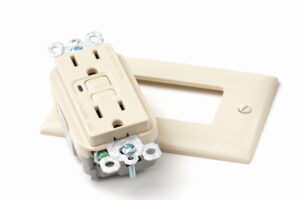In the realm of electrical safety, two acronyms often pop up: GFCI (Ground Fault Circuit Interrupter) and AFCI (Arc Fault Circuit Interrupter). Both are crucial components in safeguarding your home against electrical hazards, but understanding their differences is essential. In this blog post, we’ll explore the distinctions between GFCI and AFCI outlets, as well as the signs indicating the need for an upgrade or electrical repair in Mendenhall, MS, and why it’s crucial to enlist the expertise of a licensed electrician.
GFCI vs. AFCI: Unraveling the Acronyms
GFCI Outlets:
GFCI outlets are primarily designed to protect against ground faults, which occur when electricity travels an unintended path to the ground. This can happen if a person comes into contact with a live wire or faulty equipment. GFCIs continuously monitor the flow of current, instantly shutting off power if they detect a deviation, thereby preventing electric shock.
These outlets are commonly installed in areas where water is present, such as kitchens, bathrooms, outdoor outlets, and basements. The distinctive “Test” and “Reset” buttons on GFCI outlets allow users to manually check their functionality regularly.
AFCI Outlets:
On the other hand, AFCI outlets focus on preventing fires caused by arc faults. Arcing happens when an electrical current veers off its intended path, leading to sparking or overheating that could ignite nearby materials. AFCIs constantly monitor the circuit for these irregularities, cutting power if an arc fault is detected.
AFCI outlets are typically installed in bedrooms, living rooms, and other areas where electrical fires may pose a risk. Their ability to identify and respond to potential fire hazards makes them an invaluable addition to home safety.
Signs Your Outlets Need an Upgrade
GFCI Outlets:
- Age: If your home is equipped with older outlets, they may lack the advanced safety features found in modern GFCI outlets. Consider upgrading to ensure optimal protection.
- Tripping Frequency: If your GFCI outlets frequently trip, it may indicate a wiring issue or a faulty outlet. Continuous tripping should be addressed promptly to maintain electrical safety.
AFCI Outlets:
- Older Homes: Older homes may lack AFCI protection altogether. Consider upgrading your outlets if your home was built before the widespread adoption of AFCI technology.
- Flickering Lights: If you notice lights flickering or unusual sparking, it could be a sign of potential arc faults. Promptly consult a licensed electrician to assess the situation.
The Importance of Professional Assistance
While some homeowners may be tempted to tackle outlet upgrades as a DIY project, it’s crucial to emphasize the significance of hiring a licensed electrician. Electrical work involves intricate systems and potential hazards that require specialized knowledge and expertise. Here are some reasons to rely on professionals:
- Safety: Licensed electricians are trained to handle electrical systems safely, reducing the risk of accidents, shocks, or fires during installation.
- Code Compliance: Electrical work must adhere to local building codes. Professional electricians are well-versed in these regulations, ensuring that your home remains compliant.
- Peace of Mind: Professional installation provides peace of mind, knowing that your GFCI and AFCI outlets are correctly installed and functioning as intended.
Understanding the distinctions between GFCI and AFCI outlets is essential for maintaining a safe and secure home environment. Regular checks for signs of wear and tear, along with prompt upgrades when necessary, contribute to the overall electrical safety of your home. Remember, when it comes to electrical work, always entrust the job to a licensed electrician for the utmost assurance of safety and compliance.
Schedule an electrician visit with AirSouth Cooling and Heating today!








